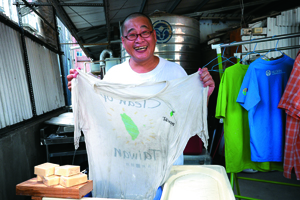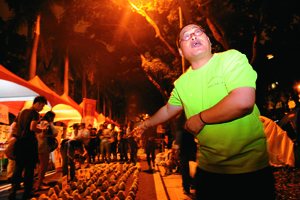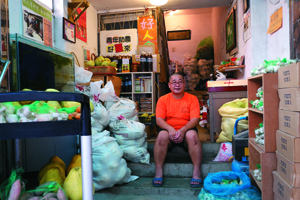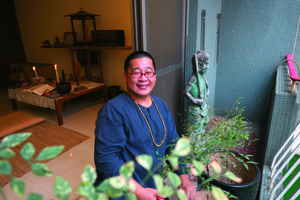

| The House of Good People—A Creative Samaritan Huang Rong-dun | ||||||||||||
| By Pan Mei-ling Translated by Tang Yau-yang Photos by Alberto Buzzola Used with permission of Rhythms Monthly Magazine | ||||||||||||
Hot real estate markets in Taipei have priced out many people. On October 4, 2014, some of those persons and their sympathizers called for housing justice by staging a protest on Renai Road, a tree-lined boulevard along which stand some of the priciest residences and shops in the city. In the midst of the crowd, a small truck made its way to the curb. Huang Rong-dun (黃榮墩) and his cohorts climbed out of the cab and quickly unloaded large bags of pomelos (similar to grapefruit). They untied the bags, emptied out the pomelos, and lined the fruit up neatly in a rectangular pattern on the pavement. The pomelo, the largest of citrus fruits, is traditionally associated with the Mid-Autumn Festival, an important Chinese holiday. In Taiwan, the fruit is a must-have during that season, and there is usually a high demand for it. However, once the festival is over, the price of the fruit plummets. When Huang put the fruit on display, the Mid-Autumn Festival had been over for nearly a month. Because the festival demand had not exhausted the available supply of pomelos, many of them remained on the market, albeit at low prices. Crowds gathered around Huang’s pomelo rectangle. They wondered what the fruit was doing there when the Mid-Autumn Festival had already ended some time before. After asking what Huang was doing, they took pictures of the fruit diagram and posted them on their favorite social media sites. “Be good Samaritans, support the farmers,” Huang shouted. “Buy their slow-selling fruit from a bumper crop!” Huang and two young volunteers, Yang-ling (仰玲) and Sheng-hui (生輝), hawked their goods to passers-by, raising their voices to be heard over the racket at the scene. Standing off to one side, I saw how good Huang was at setting up a display, livening up the atmosphere, and engaging the crowd. I was impressed by his creativity and activism. Watching him made me realize that, to be a really helpful do-gooder, one has to have more than just a good heart: One must also use one’s brain. Huang surely has used his a lot. For example, to help egg producers increase their sales in a glutted market, he learned to cook eggs in such a way as to make them soft on the inside and chewy on the outside. When garlic was in excess supply and its price tumbled, Huang helped farmers speed up the turnover of their stock. He called on volunteers to skin the garlic to help sell it. He set up stands to sell the garlic, and he explained to consumers that it was fresh from the Yunlin area, a major agricultural center. He emphasized its superb flavor and nutritional value. He also helped sell soap made from used cooking oil (more about this later in this article). Huang Rong-dun helps people in various ways, all under the name of what he calls “the House of Good People.”
Happier farmers, better society In July 2014, pomelo trees in Ruisui, Hualien County, eastern Taiwan, were heavy with maturing fruit. It looked like it would be a bumper year for the orchards…until Typhoon Matmo hit. The storm swept about 70 percent of the pomelo fruit crop off the trees. Farmers were devastated. But in the midst of the catastrophe, Huang Rong-dun had an idea. He suggested that the farmers add brown sugar to their otherwise useless fruit and let it ferment to make “eco-enzymes” useful for cleansers or fertilizers. Then he bought large plastic buckets needed for that undertaking and gave them to the farmers. Three months later, he and his son Shu-yan (舒燕) drove a truck to Ruisui to pick up the enzyme-filled liquids that the farmers had made and took them to Taipei to sell. Among its many good deeds, the House of Good People is most famous for helping farmers turn stocks of excess agricultural products into cash. This goes back to 2007, when Huang was secretary general of a community development committee in Hualien. He learned by accident that eggplants were selling for a paltry 1.50 Taiwanese dollars (five American cents) per pound. That meant that even if farmers could sell their entire crop, they’d get next to nothing in return. What could they do? Huang decided to do what he could to help. He bought a whole truckload of eggplants for 1,500 Taiwanese dollars (US$50), hauled his purchase to a famous local temple, and set up a stall in front. Then he left the eggplants unattended, leaving only a note briefly explaining the situation and a box for purchasers to drop money into. He made a whole lot more money than he had expected; in fact, the endeavor far eclipsed his wildest expectations. The response gave him great confidence and opened the door to a series of good deeds.
Everybody’s business The House of Good People was not a name that Huang picked out of thin air. Many people have piled praise on Huang and his volunteers, and their kind words have often included phrases like “good people” and “good deeds.” He thus decided to call his group of volunteers “The House of Good People.” “We’re actually quite a loose organization,” he said. “We don’t have many people, and we have no funds. We have no regular volunteers, much less organized volunteer training programs. But however unorganized we may seem, we’re glad that we’ve become the way we are.” This sentiment is consistent with his philosophy of helping others. He believes that doing good should not be the exclusive province of formal organizations, but that it is something that any individual can do in their everyday lives, at any time. The helper does not have to be wealthy. When you see someone in need and reach out to help, you automatically become a member of the “gang of good people.” The Taipei office for his crusade is an old apartment on Hangzhou South Road. The House of Good People branched out of its Hualien place to this old apartment in 2011. Here Huang keeps sacks of farm products he has rounded up from distressed farmers. He often has more products than space, so the stairwell and available empty places also become his storage areas. When we visited, we saw sacks of pomelos, garlic, sweet potatoes, and bar soap made from used cooking oil everywhere we looked. Huang keeps a vegetable stand on the street level; it is unattended and never closes. People simply deposit money for their purchase. The open stall, based entirely on the honor system, is friendly and rather unique in the big city of Taipei. Is cheap bad?
With the Mid-Autumn Festival over, pile after pile of unsold pomelos from Hegang, also in Hualien County, crammed the office. “Why do people stop eating pomelos after the festival?” Huang wondered. “The fruit is actually at its best, sweetest and most delicious, long after it has been picked.” Pomelos keep for a long time, often months. They are perfect for human consumption in the post-season market, but they are neglected because they can no longer fetch good profits for merchants. “Amidst all this, people fail to recognize that when a fruit is at the peak of its production, it is also [farthest from use of chemicals and] closest to being organic,” Huang pointed out. Bountiful harvests are often followed by slow sales and bargain-basement prices. This scenario has been repeated time after time, and farmers wish they could get a better handle on the situation. On this subject, Huang has much to say: “Never think that you can lower the price enough to move a product that’s lost favor. Besides, if you sell cabbage for two Taiwanese dollars [six American cents] a head, you won’t even be able to cover the cost of harvesting. Not only that, but the low prices can disrupt the market.” He believes that flooding the market with farm products at cut-throat prices only makes things worse. “If you really want to help farmers, you must sell their products at reasonable prices.” Huang has striven to build a mechanism to support reasonable prices in a glut. For this mechanism to work, he needs to convince people to pay prices higher than prevailing market prices; he needs to awaken people to believe that doing such a seemingly irrational thing is actually worthwhile. Consumption in this way embodies another level of meaning. That’s why Huang refers to people who purchase from distressed farmers as “helpers” instead of “consumers.”
Early indoctrination Huang impressed me with his eloquence and clear logic when I first interviewed him. After I got to know him better, however, I learned that as a child he used to be quite unsure of himself. Whenever his teacher asked him to speak in class, he’d freeze with stage fright. His classmates would ask him afterwards, “Why were you shaking all over?” He did not do well in school, and he was the perennial holder of the second-to-last place in his class. He only discovered the source of his trouble when he was in third grade. His homeroom teacher, who taught most of the school subjects to that class, had been accidentally burned by hot oil and was replaced by another teacher. The boy was surprised to find that he completely understood what the new teacher was teaching—an experience that he had never had with the original teacher, who had come from mainland China and spoke with a strong accent. Huang’s grades improved, and he eventually went to college and graduated from the Department of History at Fu Jen Catholic University. He taught in Hualien before forming the Hand-in-Hand Teen’s Service Center in 1994. His grandfather was active in helping people in need, so Huang cut his teeth in philanthropic work early. He remembers tagging along when the old man went about doing things for the benefit of the public. Huang cites one example from his childhood: “Come along, big guy,” the senior Huang hollered one day, “let’s go fix the road.” The little boy quickly filled a basket with dirt and went with his grandfather to fill some potholes. Huang recalled that in his hometown in the countryside, people swept public streets in the morning as a matter of course. They did it on their own initiative—nobody asked them to do it. He lamented that such wholesome acts and goodness have all fallen by the wayside in the process of urbanization. Because of his upbringing, serving others became second nature to him. He organized people to be “temporary grandchildren” at the Hualien Railway Station to help elderly people carry their luggage. When a typhoon knocked the Suhua Highway out of service, farmers could not ship their vegetables to Taipei. In response, Huang called on train passengers to help, encouraging each passenger to take some vegetables onto the train and carry them to Taipei. Though the managers at the Hualien Railway Station, citing internal rules, would not lend their support, Huang pressed ahead anyway. In the end, the effort proved successful and he put out another fire for the farmers—again with the help of an army of volunteers who had almost no formal organization. Huang commented that few things could be accomplished if they were all done “by the book.” Other ideas that he has implemented to help farmers include “buy by the truckload,” “armies of eaters,” and “community dining halls,” each brimming with heart-warming creativity in line with his history. Each of those efforts, if you considered the time and manpower involved, were apparently cost-ineffective. However, they all successfully aroused the love in people. Seen from that viewpoint, the efforts were quite effective. “It’s important that we believe that we’re good people,” he pointed out. “Equally important is that there are folks willing to act on their goodness.” For him, the good people movement is not just about helping those in need, but more about bringing out the good in people’s hearts to make our society better. He wants to recruit “one good person, ten good people, a gang of good folks” to get on his bandwagon.
Used cooking oil “Gutter oil,” a term used in Taiwan and China, is obtained from waste oil collected from many sources, including restaurant fryers and slaughterhouse waste. Such oil is strictly forbidden for human consumption. However, in 2014 it was discovered that some unscrupulous merchants in Taiwan had been processing and repackaging gutter oil and selling it as cooking oil, reaping astonishing but illegal profits. When the scandal broke, people in Taiwan began to pay attention to the disposal of used cooking oil. Long before the issue came to the attention of the general population, Huang had been promoting the use of waste oil in making soap, thus helping solve the disposal problem. For three years now, he has regularly purchased such soap produced by the Hsinchu Patrolling Volunteers Association (HPVA), the Penghu Single Moms Workshop, the Taichung City Association of Parents of Mentally Disabled Children, and Xianxi Junior High School in Zhanghua and promoted its use to consumers. For Huang this soap is good for cleaning and personal hygiene, and at the same time it helps protect the environment and creates jobs for the disadvantaged. Middle-aged Zhou Gui-mei (周桂美) lost her old job, but she wanted to return to work. She went to the HPVA and learned to make soap and eco-enzymes. She is grateful that these skills gave her a chance to find a new job. In 2013 the HPVA collected 1,300 liters (343 gallons) of used oil from fried chicken stores, stinky tofu stands, and other restaurants. With that oil it made 1,300 kilograms (2,866 pounds) of soap, achieving a defect rate of almost zero. No doubt the Hsinchu association was quite good at making soap, but it was not nearly as knowledgeable in selling what it made. Even after giving away 70 percent of its soap and saving only 30 percent for sale, the association still had trouble selling that 30 percent and could barely find enough room to store the inventory. Huang realized that for the soap initiative to sustain itself, there had to be a repeating cycle of production and use. With the widespread use of washing machines, people rarely wash their clothes by hand anymore. The machines require liquid or powdered detergent, and so bar soap for washing clothes is not as popular as before. “I used to urge people to be eco-friendly by using recycled bar soap,” Huang said, “but then I realized that I myself had been all talk and no walk with regard to soap use.” Since he was not a user himself, how could he expect other people to be any different? He had identified the problem, but then he needed to find a solution. He decided to launch a “Wash Your Clothes by Hand” movement. He himself practices what he preaches. In the sweltering heat of summer, he routinely changes T-shirts at least three times a day. He washes them by hand with recycled soap. To promote the idea to the public, he fashioned a mobile washtub, complete with a sink, a scrub board, and a self-contained water supply—all on a wheeled cart. He then showcased his brainchild to the crowds at the demonstration for housing justice mentioned at the beginning of this article. He urged his audience to come forward and try washing with his recycled soap, explaining to them how such soap was a solution to the thorny issue of waste oil disposal. He successfully grabbed people’s attention, and they inquired how to purchase this type of soap. Huang pointed out that used oil had always been a problem for which the government had been unable to find a sound solution. That is why it became a source of potential misuse. “If we take used oil and make soap out of it, then it can’t be made into fake cooking oil that can hurt our health,” Huang declared. “Besides, when you buy this soap, you provide financial support for disadvantaged families too.” As small as it is, a bar of soap can do a lot of good.
An idea factory Though we have shown quite a few of Huang’s ideas, this is by no means a complete list. When he becomes aware of a difficult situation that farmers or others are facing, he tries to help. All the initiatives that he has launched share one thing in common: They are all down to earth, concerned with people’s everyday life. “Please help me eat these cabbages!” urged a campaign slogan of Huang’s to help cabbage farmers. “Allow me to treat you to some juice” offered another slogan for a campaign in which Huang’s volunteers offered free juice on the streets to raise public awareness of the problem of the oversupply and dull sales of oranges. At the same time, they advertised the benefits of eating fruit at the height of its production, when it is flavorful, fresh, abundant, and inexpensive. Another time, volunteers showed up at convenience stores and gave away shredded cucumbers and carrots to shoppers who had bought cold noodles from the stores. The noodles are a ready-to-eat item to which these two vegetables are often added. The shoppers received a couple of extra veggies for the day and they learned something about the quandary that the vegetable producers were in and how the shoppers might help. Sometimes Huang shows up at surprising moments or venues. For example, in the tense moments of some public demonstrations, he has arrived with a pot of hot vegetable soup or chow mein with cabbage to warm the stomachs and hearts of protestors. At the same time that he’s giving people something heartening and practical, Huang and his fellow workers get a chance to advance their own cause. Huang attributes the success of what he calls the “good people movement” to the fact that our society has feelings. “If folks didn’t have feelings, if they weren’t willing to act on their goodness, how could we have resolved these challenges over and over again?” People often ask him how he can be so brimming with ideas and creativity. He says that he isn’t a smart person, but that he has been able to come up with many ideas because he sincerely wants to help the society of which he is a part. He feels for the youth and for the elderly. Such care for people has led to one light bulb after another going on in his brain. “Many people go to distant corners of the world, such as Africa, in the pursuit of their grand dreams to help others,” Huang said. “However, they tend to brush aside problems they witness around them in their daily lives.” Everybody’s circumstances are different. Only a few people can do grand things to help, but many more people can do things on a much smaller scale for the benefit of others. Huang and his group are doing that; many others can join them. Even such mundane things as buying vegetables and washing clothes can enable us to help make the world a better place.
|













|






.jpg)